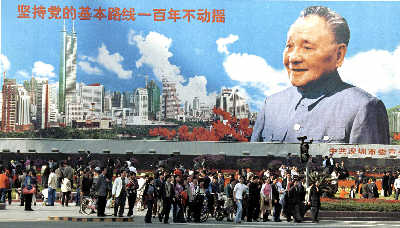At the end of 1978, the Third Plenary Session of the 11th Communist Party of China (CPC) Central Committee was held in Beijing, starting an era of China's reform and opening up. The Session adopted the policy of reform and opening up and shifted the work of the Party and State from "taking class struggle as the key link" toward economic development. From the countryside to the city, great changes have taken place in China since that decision. To mark the 30th anniversary of China's reform and opening, the China Business Weekly selected 30 major events that have had the greatest influence on China's social and economic development and have improved the people's livelihood in past 30 years.
1. 1978: The Third Plenary Session of the 11th CPC Central Committee
The Third Plenary Session of the 11th CPC Central Committee was held in Beijing from December 18 to 22 in 1978.
 |
People stroll before a portrait of the late leader Deng Xiaoping, architect of China's reform and opening up, in a square in Shenzhen, Guangdong Province in this file photo. |
The session thoroughly rejected the incorrect policy of the "two whatevers" (referring to the statement that "we will resolutely uphold whatever policy decisions Chairman Mao made, and unswervingly follow whatever instructions Chairman Mao gave").
The guideline for emancipating the mind and seeking truth from facts was reestablished, bringing order out of chaos in ideology.
The central collective leadership with Deng Xiaoping at its core was formed. The system of democratic centralism was resumed and the important task of institutionalizing and legalizing democracy was launched.
Investigations were begun to solve a batch of big problems left from history and questions concerning the merits and faults of some key leaders.
The session also started to make a scientific appraisal on Mao Zedong and Mao Zedong Thought.
The session adopted the policy of reform and opening up and shifted the work focus of the Party and government from "taking class struggle as the key link" to economic development, starting China's historical transformation from the rigid or half-rigid system to all-around reform, from closed or half-closed to opening up to the outside world.
2. 1979: Setting up Special Economic Zones
On July 15, 1979, the CPC Central Committee and the State Council, China's cabinet, approved the Report on Carrying out Special and Flexible Policies for Foreign Economic Activities submitted by Guangdong and Fujian provincial CPC committees and decided to set up trial special zones in the cities of Shenzhen, Zhuhai, Shantou, and Xiamen.
On August 13, the State Council issued Regulations on Several Questions Concerning the Development of Foreign Trade to Increase Foreign Exchange Reserve. The core of the regulation concerns enlarging the foreign trade competency of local governments and enterprises and encouraging the increase of exports.
On May 16, 1980, the CPC Central Committee and the State Council formerly changed the name of "Special Zones" to "Special Economic Zones".
At the beginning of China's reform and opening up, due to a lack of experience on foreign economic exchange and an incomplete domestic legal system, the setting-up of the Special Economic Zones played an extremely important role in furthering domestic reform and expanding foreign economic exchanges.